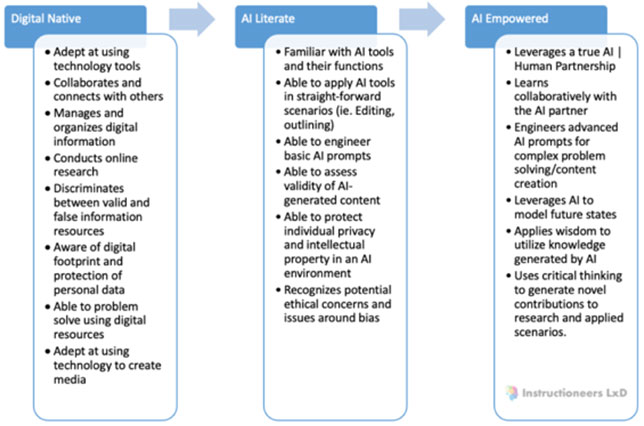10 AI Skillsets for the Digital Native Educator
These skills collectively empower educators to navigate and leverage the evolving landscape of generative AI to enhance teaching and learning in meaningful ways. Integrating AI into education requires a combination of these skillsets along with a forward-thinking and intellectually curious mindset.
Artificial Intelligence (AI) has been around for decades; however, with the introduction of generative AI, such as ChatGPT, there has been a newfound focus on how technology tools can impact the educational landscape. The AI revolution in industry is upon us and is beginning to establish itself as a permanent part of educational practice as evidenced by Lucarillo, Nagel, Hardman, and others. Therefore, it is crucial to equip teachers with the skills to use AI in ways that ensure a high-quality education for the students in classrooms across the globe.
The urgency to upskill teachers is highlighted by the gap in skills that already exists in classrooms today, underscoring the digital divide. Just as in any content area, students come to classrooms with varying readiness levels and educational needs; using AI is no different. For example, there are preschoolers who play games on an iPad with empowered intelligent tutors. My prereading granddaughter uses AI predictive text programs, dictation technology, and iconography to text me from her mother's phone and to locate videos and programs she wants to watch. Some children, like her, have access, while there are many others who have no exposure or use of AI. Educators are encountering students at different AI literacy levels, and this divide will continue to grow. Therefore, teachers need to build the skillsets to increase their AI literacy and integration to develop more digital equity, serving students who are at a low readiness level, as well as those who are using AI as a writing partner.
AI can enable teachers to optimize their teaching methods, fostering a more impactful learning experience for students. When thoughtfully designed and effectively employed, AI can contribute significantly to improved teacher practice and, consequently, positive student outcomes. Utilizing AI-driven tools and approaches empowers skilled educators to tailor learning experiences, enhance student achievements, and more effectively equip students for success in the digital era.
Dr. Chris Dede, Harvard University, says artificial intelligence requires educators to get smarter about how they teach to truly take advantage of what AI has to offer; that we need to focus on the open-endedness of learning. Empowering educators with the skills: "the knowledge, abilities, or learned behaviors an individual can demonstrate or acquire." Finally, the presence of tools that encourage critical thinking, problem-solving, and real-world application contribute to the development of higher-order cognitive skills crucial for lifelong learning. In essence, instructional materials play a crucial role in connecting curricular goals with classroom implementation, and AI can support teachers in advancing towards a more effective and equitable education.
Dr. Kim Round explains the differentiating factors of the digital native and the AI empowered in "From Digital Native to AI Empowered: Preparing for the Next Generation of Learners." These concepts can be applied by the educator as they grow, learn and partner with AI using generative AI for developing lesson plans, creating rubrics, generating writing prompts and quiz questions, and more. The possibilities are endless.


AI skillsets necessary for the Digital Native Educator:
- Technical Proficiency
- Collaboration
- Adaptability
- Digital Citizenship
- Information Management
- Information Synthesis
- Critical Thinking
- Creativity
- Continuous Learning
- Media Literacy

These skills collectively empower educators to navigate and leverage the evolving landscape of generative AI to enhance teaching and learning in meaningful ways. Integrating AI into education requires a combination of these skillsets along with a forward-thinking and intellectually curious mindset.
Following is a definition of each skillset with resources that may help develop these skills or get a concrete idea of what that skillset looks like in practice. You may be able to find additional resources or apply a resource to different skillsets - do so.
- Technical Proficiency
Digital native educators need to have comfort and expertise using a variety of digital tools and platforms and begin to navigate technology-related issues.
- Collaboration
Digital native educators should be able to work with colleagues and share knowledge about effective AI use. They should begin to promote collaborative and experiential projects using AI for their planning, routine, administrative, or repetitive responsibilities.
- "AI in Edtech: Helping Pave the Way for Personalized Education" emphasizes the collaborative partnership between educators and AI in edtech, emphasizing the implementation of ethical and responsible AI to enhance student outcomes and equity in education. It advocates for using AI as a tool to assist teachers in tasks such as personalized learning and adaptive assessments while ensuring that decision-making remains in the hands of educators for the benefit of student welfare.
- In "This Husband-and-Wife Team Created a Chatbot Just for Teachers," Madeline Will highlights the collaborative effort between educators and AI in a Texas school district, where an AI-powered chatbot named Agnes serves as a virtual personal assistant for teachers. Agnes assists with various tasks, including answering questions, providing information on school policies, and aiding in lesson planning, demonstrating the potential for AI to streamline administrative responsibilities and enhance teaching effectiveness through collaboration.
- Adaptability
A mindset of being flexible with technology themselves, with their students and with their colleagues and the willingness to explore and experiment with emerging tools are important for the digital native educator.
- Dr. Phillipa Hardman introduces an AI-Powered Learning Science Bootcamp that encourages educators to explore and experiment with AI tools for designing and building courses. It highlights the use of ChatGPT for various educational tasks and emphasizes that AI in content creation is just the beginning, promoting a mindset of flexibility and experimentation with emerging tools among educators.
- Digital Citizenship
Understanding the concept of a digital footprint and its implications while taking measures to protect personal data and privacy online are imperative for the digital native educator.
- In "How Does AI Know Stuff," AI for education provides safeguard techniques for offering filtered training data, ensuring human feedback, allowing regular updates, and conducting external audits.
- Lauraine Langreo stresses the irreplaceable role of teachers in education despite the integration of AI-powered tools emphasizing the need for educators to understand the limitations and potential risks of AI tools, such as biased responses and exposure of sensitive data in "6 Things Teachers Do That AI Just Can't."
- Information Management
The digital native educator should systematically and strategically handle data and knowledge to derive meaningful insights, make informed decisions, and optimize processes and student learning.
- The EduGals Podcast stresses the need for educators to navigate the integration of AI tools like ChatGPT with a systematic and strategic mindset. They emphasize the importance of focusing on skills development, critical thinking, and ethical considerations in the era of evolving educational technology.
- Amanda Bickerstaff, the CEO and co-founder of AI for Education, continues the AI Launch Pad Webinar series with Alex Muscat, Head of Data at Brisk Teaching, to delve into "Formative Feedback with AI: Opportunities and Risks." They explore methods for utilizing AI to offer specific and timely feedback, while also providing educators with prompts to create engaging formative assessments.
- Information Synthesis
Digital native educators must be able to gather, analyze, and integrate diverse pieces of information from various sources to generate new insights, knowledge, or solutions by leveraging AI.
- In the EdTech blog, Class Tech Tips, Dr. Monica Burns discusses "10 Things Teachers can do with ChatGPT to Save Time" in a blog post that focuses on ways educators can leverage the chatbot for efficiency. While acknowledging it's not designed for students, the post outlines ten ways educators can benefit from ChatGPT while also exploring potential student applications and classroom impact, despite its lack of compliance.
- Critical Thinking
AI generates information that the digital native educator needs to analyze, evaluate, and interpret beyond face value by assessing the validity, relevance, and the potential biases of the content.
- In the article "Navigating AI Ethics in Education," Professor Synapse emphasizes responsible AI use in education, addressing ethical considerations for both teachers and students. Synapse provides practical advice, best practices, and guideline.
- The Wichita school district's strategic use of AI for research, communication, and lesson enhancement reflects a thoughtful application of technology, requiring educators to analyze, evaluate, and interpret its role in fostering critical thinking skills in "ChatGPT Is Everywhere in This District. Here's What It Looks Like" by Caitlyn Meisner.
- Creativity
The digital native educator employs innovative and imaginative AI tools and integration to enhance or transform educational experience including teaching methodologies, curricula, instruction, and learning experiences that address the diverse needs of students.
- This article emphasizes the importance of educators embracing AI as a tool for idea generation, organization, and writing assistance rather than fearing its misuse. Cheri Shields, an English teacher, discusses using ChatGPT to generate prompts, create outlines, and provide feedback on grammar and structure, underlining AI's capacity to enhance the creative and critical thinking aspects of the writing process in "Don't Ban ChatGPT. Use It As A Teaching Tool."
- In "What ChatGPT Means for How We Teach Writing," Anne Bruder, an academic dean, acknowledges the fears of teachers but emphasizes the need for educators to adapt and guide students in utilizing AI as a tool for exploration. Bruder advocates for a shift in teaching methodologies towards personalized, exploratory assignments that encourage students to critically engage with AI-generated content while emphasizing the irreplaceable value of human creativity and critical thinking in education.
- Continuous Learning
The ongoing process of acquiring, updating, and expanding knowledge and skills related to AI technologies and their applications. It involves staying abreast of advancements in AI, adapting to new methodologies, and refining one's understanding of AI concepts and tools.
- In "Schools Need to Help Students Use AI Tools Effectively, Expert Says," Lauraine Langreo highlights the rapid integration of generative artificial intelligence (AI) in K–12 education, urging educators to adapt to this change. The article emphasizes research that advocates for a balanced approach, which involves developing use policies, rethinking education, and fostering collaborative efforts among educators to explore and implement AI tools while maintaining a focus on fundamental student skills like critical thinking and creativity.
- Media Literacy
Critically evaluate, analyze, and comprehend information and content produced by AI with an understanding of the characteristics of credible sources is imperative for the digital native educator.
- An EdWeek Research Center survey reveals that a significant majority of educators feel unprepared to teach students the skills required in an AI-driven world. To address this, Lauraine Langreo in "What Teachers Need to Know About AI, But Don't," suggests that teachers need time to learn about AI, emphasizing the importance of professional development and mentorship. It also calls for a revamp of preservice teacher training to ensure prospective teachers have a foundational understanding of AI and highlights the need for changing standards and assessments to accommodate the use of AI tools in education.
Below are some additional resources where multiple skillsets can be found or that could be used to implement AI in the classroom.
- In "The AI Toolkit for Educators," Dr. Stella Lee provides teachers with insights into the current AI landscape in education, emphasizing its applications in supporting learners, personalized approaches, and faculty assistance. Lee covers AI tools for administrative tasks, research, and teaching, highlighting challenges such as unequal access and the need for diverse skillsets. The resource also guides teachers in developing AI literacy, covering fundamentals, data fluency, critical thinking, ethics, and includes additional resources and a glossary.
- Under the guidance of Dr. Miguel A. Cardona, The Office of Educational Technology provides The Artificial Intelligence and Future of Teaching and Learning resource for teachers which delves into the increasing significance of AI. It provides a comprehensive overview, including reasons to address AI in education, policy considerations, ethical foundations, and practical insights into AI's impact on learning, teaching, formative assessment, and research and development. There is also a set of recommendations for educators and policymakers to effectively incorporate AI in education while prioritizing ethical, human-centric, and context-aware approaches.
- OpenAI, the organization behind the generative AI tool ChatGPT, has created a growing resource for teachers, the Teaching with AI blog, with suggestions, resources, and related research. This has the potential to be a goldmine.
Note: OpenAI's GPT-3.5 provided editing support during the article's drafting process.